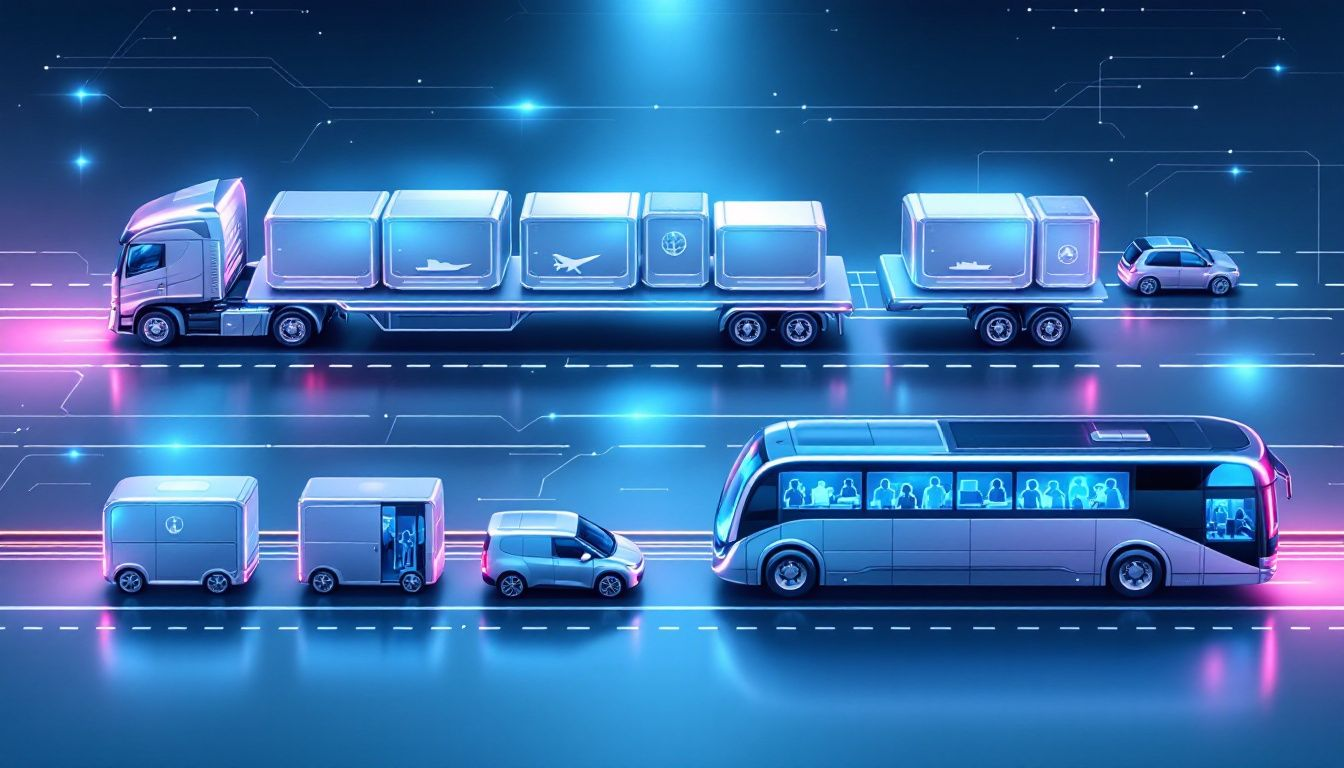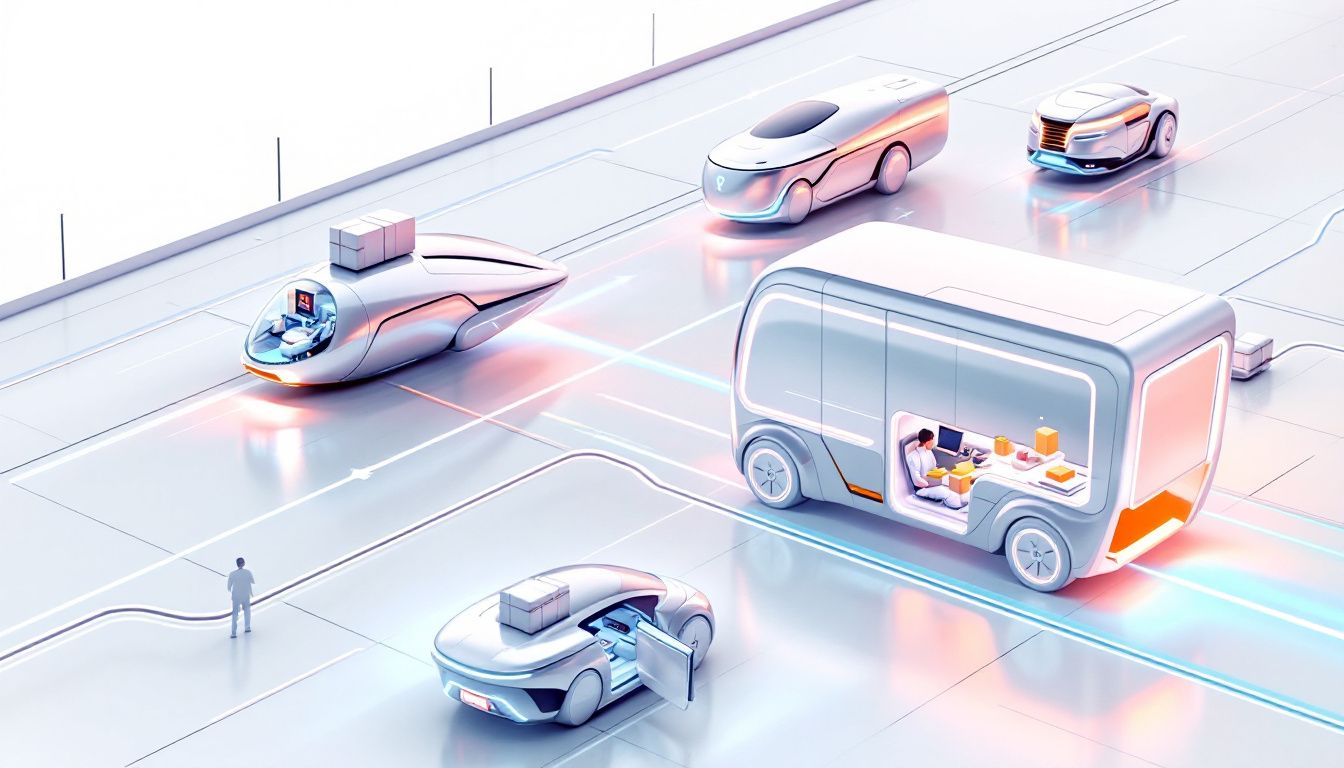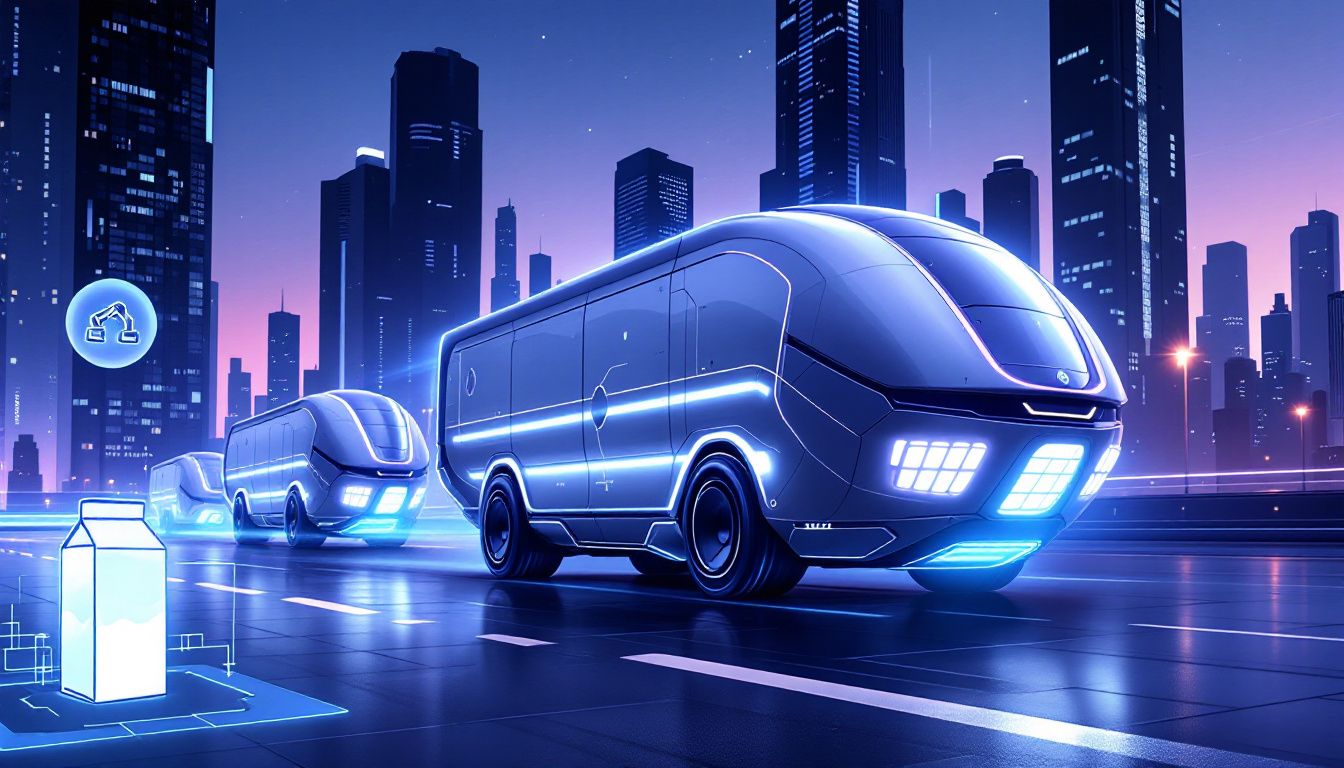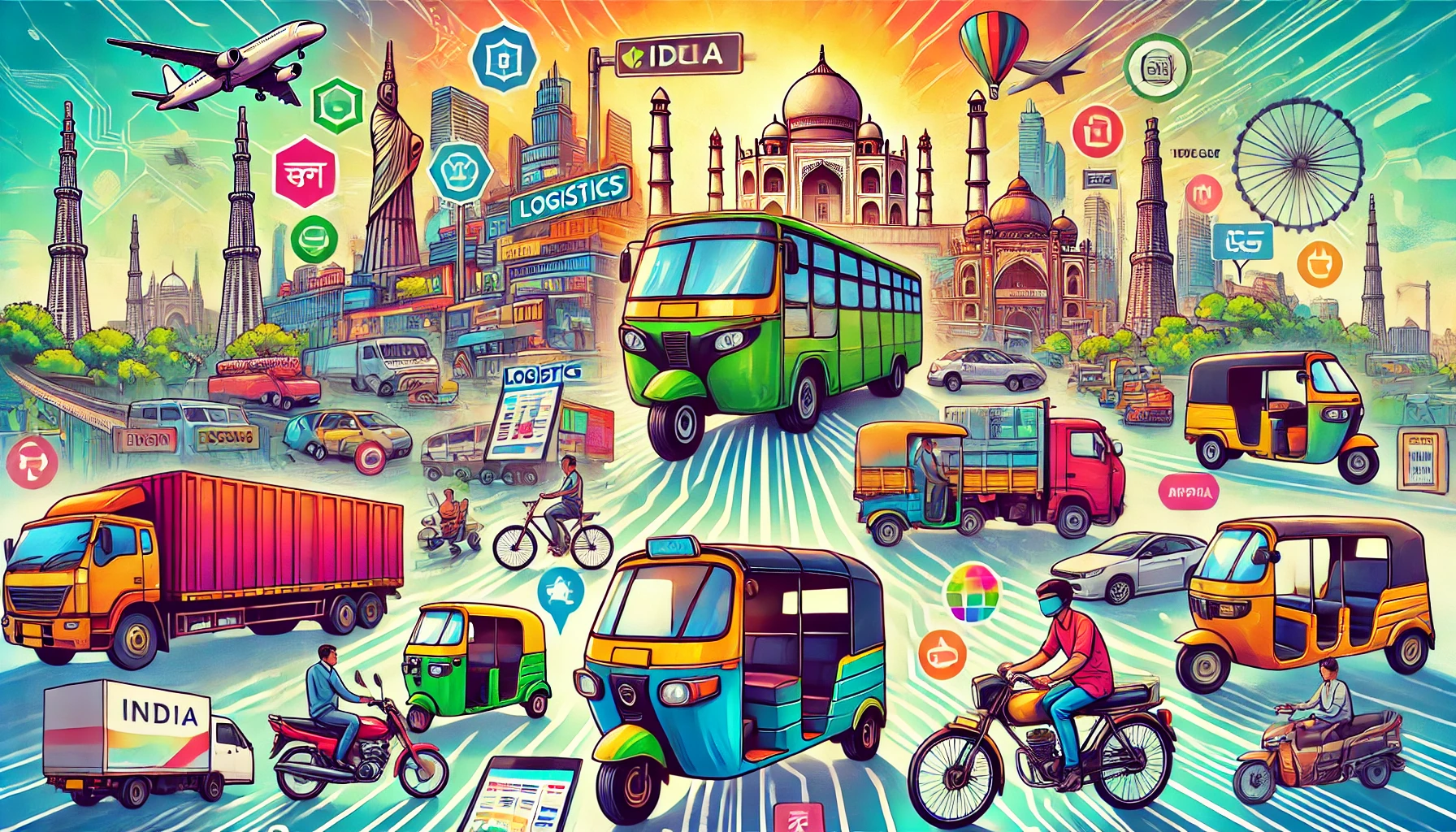Looking for transport business ideas to start in 2025? This article dives into 10 profitable options, from truck transport to e-rickshaw services. Get insights on setup, costs, and potential profits to help you choose the right venture and scale successfully. Read ahead to find the best opportunities in the transport industry.
Key Takeaways
- The truck transport business is highly profitable due to the strong demand for goods transportation, driven by e-commerce growth.
- E-Rickshaw services present a sustainable and cost-effective urban transport option, meeting rising eco-friendly transport demands.
- The courier services sector is booming, propelled by e-commerce expansion, with opportunities for specialized delivery services and real-time tracking technologies.
Truck Transport Business

The truck transport business is the backbone of the logistics industry in India and globally. With the rise of e-commerce and the continuous need for goods transportation, this truck business sector is witnessing unprecedented growth in the transportation industry.
The truck transport business in India is highly profitable due to the significant demand for transporting goods, especially imported ones. This makes it a promising venture for aspiring entrepreneurs.
Why Truck Transport is Profitable
The truck transport business is a cornerstone of many industries, reflecting a high demand for its services. Truck transport is essential for moving goods across various sectors, making it a highly profitable venture if the right strategy is employed. The potential profitability is significant, especially when considering factors such as operating costs and market demand. Profit margins in the transport business in India range from 5% to 25%, indicating substantial earning potential.
The transport industry can generate expected revenues exceeding 15 trillion US dollars, showing its vast market potential. To increase profitability, focusing on efficient resource use, route planning, and vehicle maintenance is essential. Operational efficiency can also be enhanced with logistics software for real-time tracking of goods.
All these factors contribute to making the truck transport business a lucrative option in the transportation sector.
Required Licenses and Permits
Starting a truck transport business in India requires securing several mandatory licenses and permits. Key requirements include company registration with the Ministry of Corporate Affairs, GST registration, and a valid vehicle license. Additional licenses such as a goods carrier license, a national permit, and a vehicle fitness certificate are also essential.
Consulting with industry experts or government agencies can help navigate the complex licensing process.
Best Trucks for Transport Business
Investing in appropriate vehicles is crucial for the success of a truck transport business. Common types of trucks used include large container trucks, mini trucks, and customized trucks. The price range for trucks in India varies significantly, from 4 lakhs to 80 lakhs, catering to different business needs.
Factors like the number of axles, engine size, and fuel tank capacity should be considered when choosing trucks. Ensuring that the vehicles meet safety and emission standards is also important.
E-Rickshaw Services

E-Rickshaw services are gaining popularity due to their eco-friendly nature and suitability for urban transport. These electric vehicles offer a sustainable and affordable transportation option, making them an attractive choice for entrepreneurs in the transport industry.
The demand for such services is rising, driven by the need for sustainable and cost-effective urban mobility solutions.
Market Demand for E-Rickshaw Services
The increasing awareness and demand for sustainable transportation options have led to a growth in e-rickshaw services as an eco-friendly alternative. These services provide an affordable transport option, particularly in densely populated urban areas where traditional taxis may be cost-prohibitive for short distances.
The low operating costs of e-rickshaws make them economically feasible for daily commutes.
Startup Costs and Requirements
Starting an e-rickshaw service involves an initial investment of about 150,000 INR per vehicle. Acquiring multiple e-rickshaws can involve total costs around 1 million INR if purchasing 8 to 10 units. Entrepreneurs need to consider expenses related to equipment, licenses, and regulatory compliance.
Ensuring adherence to local regulations is crucial for smooth business operations.
Benefits of E-Rickshaws
E-Rickshaws promote sustainability for short-distance trips, catering to the growing demand for eco-friendly transportation. They are affordable, making them a practical option for urban commuting.
Additionally, e-rickshaws contribute to reduced air pollution and lower operational costs, making them a viable and environmentally friendly choice in the transport sector.
Courier Services

The courier services sector is booming, driven by the rapid growth of e-commerce and online shopping. This surge in demand presents numerous opportunities for new businesses in the transport industry.
Setting up a courier service involves thorough market research, developing a solid business plan, and acquiring the necessary licenses and permits.
Increasing Demand for Courier Services
The demand for courier services has risen significantly due to the expansion of e-commerce. With more consumers shopping online, the need for reliable and efficient delivery services and specialized services has never been higher.
This trend makes courier services a profitable venture in the commercial service transport business.
Setting Up a Courier Service
To set up a courier service, it is essential to consider factors such as required vehicle types, purchase or lease costs, and ongoing maintenance expenses. Real-time tracking and advanced route optimization are critical for adapting to delivery challenges and meeting customer expectations. Implementing these technologies can significantly enhance operational efficiency and customer satisfaction.
Acquiring a reliable fleet of delivery vehicles is fundamental to establishing a successful courier service. Additionally, understanding the costs involved, including vehicle expenses, staff salaries, and insurance, is vital for financial planning.
Ensuring compliance with legal requirements and securing the necessary licenses and permits is crucial for the long-term growth and success of the business.
Profit Margins in Courier Services
The profit margin for courier services typically ranges from 8% to 9%. Profitability can be influenced by various factors such as the type of service offered, location, competition, operating efficiency, and market demand.
Strategies to maximize earnings include offering specialized delivery services, improving operational efficiency, and diversifying revenue streams.
Grocery Transport Services

Grocery transport services have become increasingly essential due to the rising demand for timely delivery of fresh products in urban areas. The growth of online grocery shopping has led to an urgent need for rapid delivery services to satisfy consumer expectations.
This sector plays a crucial role in ensuring quick deliveries of fresh goods, responding to the increasing demand for online grocery shopping.
Role in Online Grocery Shopping
With the surge in online grocery shopping, grocery transport services are now indispensable for meeting consumer expectations for fast delivery. Over 50% of consumers have purchased groceries online recently, highlighting the critical role of grocery transport services in the supply chain.
Suitable Vehicles for Grocery Transport
Choosing the right vehicle is crucial for efficiency and effectiveness in delivering fresh goods. Suggested vehicles for grocery transport services include Tata Intra V30 Pickup, Mahindra Jeeto Mini Truck, and Mahindra Supro Profit Mini Truck.
These vehicles are compact, fuel-efficient, and designed for urban and semi-urban grocery deliveries, making them ideal choices.
Operational Strategies
To ensure efficient operations, developing a robust business plan is essential. Investing in technology for real-time tracking and route optimization can enhance operational efficiency. Understanding the target market and customer needs, along with implementing a strong marketing strategy, can help achieve business goals and maximize profitability.
Packers and Movers Services
Packers and movers services offer profitable opportunities for entrepreneurs due to the increasing mobility of businesses and the demand for relocation services. This industry is growing, driven by urbanization and a rise in migration related to job and education opportunities.
Market Opportunities
The packers and movers industry is seeing growth due to urbanization and a rise in migration related to job and education opportunities. An increasing number of nuclear families in urban areas is contributing to a higher demand for packing and moving services.
This trend highlights the market opportunities available in this sector.
Initial Setup and Investment
Starting a packers and movers business typically requires investment in vehicles, packing supplies, and initial marketing. Staffing requirements may include hiring movers, drivers, and customer service representatives.
Legal requirements must be met, including business registration, obtaining necessary permits, and tax compliance.
Marketing Strategies
Effective marketing strategies are crucial for attracting clients in the packers and movers business. Highlighting customer satisfaction is key in attracting repeat business and fostering positive word-of-mouth referrals.
Creating a professional website and leveraging social media are key marketing strategies for attracting clients in this sector.
Livestock Transportation
Livestock transportation serves a vital role in the agriculture sector and is considered a promising business opportunity. There is a high demand market for livestock transportation in India, which underscores its importance. This business directly meets essential needs of farmers by ensuring the timely and safe delivery of their livestock.
Importance in Agriculture
Livestock transportation is crucial for supporting agriculture by ensuring that livestock is efficiently moved from farms to markets. This service is a key part of many agricultural supply chains, facilitating the efficient delivery of livestock products to consumers.
Regulatory Compliance
Transporting livestock involves adhering to strict regulations concerning animal welfare and safety. Compliance with state-specific regulations aimed at ensuring animal welfare is essential.
Adhering to health regulations to prevent disease spread and ensure the welfare of animals is also necessary.
Necessary Equipment and Vehicles
Specialized vehicles equipped with proper ventilation and containment are essential for transporting livestock safely. These vehicles must have features like anti-slip flooring and adequate space to ensure animal comfort during transit.
Investing in such equipment ensures compliance with animal welfare regulations and enhances the quality of service provided.
Milk Carrier Transport Services

Milk carrier transport services are integral to the dairy industry, ensuring that fresh milk is swiftly transported from farms to distribution centers. The consistent demand for dairy products makes this sector a stable and profitable venture.
Efficient transportation is crucial to maintain product quality and prevent spoilage.
Role in Dairy Industry
Efficient milk transportation is essential for linking farms with distribution centers, ensuring that dairy products reach consumers promptly. This process is critical for maintaining product quality and fulfilling the needs of the dairy industry.
The constant demand for faster milk transportation highlights the importance of this service.
Vehicle Recommendations
Vehicles used for milk transport must ensure temperature control to prevent spoilage and maintain product quality during transit. BharatBenz offers specialized tanker trucks designed for milk transport, focusing on safety, efficiency, and durability.
These features are essential for maintaining the integrity of dairy products during transportation.
Profit Potential
The milk carrier transport services have steady demand and profitability, primarily due to the necessity of timely delivery in the dairy supply chain. With the growing dairy industry, there is an increasing demand for efficient milk transportation from farms to distribution centers.
Selecting suitable vehicles and maintaining operational efficiency are crucial for maximizing profits in this sector.
Taxi Cab Business
The taxi cab business is a well-known and regulated transport idea, often preferred for its reliability and steady demand. The shift towards using taxis instead of personal vehicles is driven by high vehicle and fuel costs, traffic congestion, and limited parking.
This trend makes the taxi business a viable and profitable option.
Market Demand and Trends
The demand for taxi services is growing due to the high costs associated with owning personal vehicles and the challenges of urban traffic. Conduct market research to understand customer needs and industry trends is crucial for success in this sector.
This helps in identifying target markets and crafting effective marketing strategies.
Licensing and Regulations
Operating a taxi business legally requires securing various permits, including passenger carriage contracts and vehicle permits. Taxi operators must obtain a taxi license from local authorities, which often requires fulfilling specific conditions such as vehicle inspections. Compliance with safety regulations and securing insurance are also mandatory.
Choosing the Right Vehicles
Selecting the right vehicles is crucial for the success and profitability of a taxi service. Popular vehicles for taxi services in India include the Maruti Suzuki Celerio, Wagon R, and Toyota Innova Crysta due to their reliability and fuel efficiency.
These characteristics ensure that the service remains cost-effective and dependable.
Limousine Services
Limousine services are synonymous with luxury and comfort, targeting high-net-worth individuals and corporate clients. The market for taxi and limousine services is projected to grow significantly, reflecting the increasing demand for premium transportation options.
This makes limousine services a profitable and appealing business idea.
Target Market and Demand
High-net-worth individuals and corporate clients constitute the primary target market for limousine services. Conducting market research to understand their specific needs and preferences is essential for tailoring services accordingly.
This helps in crafting effective marketing strategies and ensuring customer satisfaction.
Fleet and Maintenance
A trustworthy driver is essential for starting a limousine transport company. Additionally, the vehicle should be safe and well-maintained. Incorporating advanced technologies like GPS tracking and entertainment systems can enhance the passenger experience.
Regular maintenance and integrating dispatch software can significantly improve fleet management.
Marketing and Branding
When marketing a limousine service, it is essential to target high-net-worth individuals and corporate clients. Establishing a unique selling proposition and promoting luxury experiences can help differentiate the service from competitors.
Expanding the business by adding vehicles and drivers and leveraging social media for marketing can enhance brand visibility.
Boat Charters
Boat charters offer a unique business opportunity driven by the increasing demand for leisure and personalized experiences. This sector attracts various customer segments, including tourists, fishing enthusiasts, and corporate event planners.
The demand for recreational boat charters has risen due to increased interest in water-based leisure activities.
Market Opportunities
Boat charters are increasingly popular due to the rise in leisure and tourism activities. The industry in India is projected to grow significantly, driven by increasing disposable incomes and luxury experiences.
India’s extensive coastline and major ports enhance the feasibility of boat charters.
Initial Investment and Licensing
Starting a boat charter business typically requires significant upfront investment in a fleet of boats and docking facilities. To legally operate, one must obtain various licenses from local maritime authorities, including yacht registration and a permit from the Director-General of Shipping.
Compliance with local maritime regulations is essential for smooth operations.
Revenue Streams
Boat charters can generate income through diverse offerings like sightseeing tours, private events, and water sports. Providing additional services such as catering or event setups can enhance revenue potential.
Membership plans for frequent renters can provide a stable revenue source through subscription fees.
Government Support and Policy for Promoting Transport Business
The government plays a crucial role in promoting the transport business by providing various forms of support and implementing policies that facilitate growth and sustainability in the transport sector. These initiatives are designed to enhance infrastructure, streamline regulations, and encourage investment in the industry.
Infrastructure Development
Governments often invest in infrastructure development, such as building roads, highways, and ports, which are essential for efficient transportation. This investment not only improves connectivity but also reduces operating costs for transport businesses, making them more competitive.
Financial Incentives
To encourage investment in the transport industry, governments may offer financial incentives such as tax breaks, subsidies, and grants. These incentives help reduce the financial burden on new businesses and support their initial setup and expansion efforts.
Regulatory Support
Streamlining regulatory processes is another way governments support the transport business. By simplifying licensing procedures and reducing bureaucratic hurdles, they make it easier for entrepreneurs to enter the market and operate efficiently.
Environmental Policies
With a growing focus on sustainability, governments are implementing policies that promote eco-friendly transport solutions. This includes providing incentives for electric vehicles, developing charging infrastructure, and supporting research and development in green technologies.
Public-Private Partnerships
Governments often engage in public-private partnerships to leverage private sector expertise and investment in transport projects. These collaborations can lead to the development of innovative transport solutions and improve service delivery.
Training and Skill Development
To ensure a skilled workforce in the transport sector, governments may offer training programs and initiatives aimed at enhancing the skills of workers. This support helps businesses maintain high standards of service and adapt to industry changes.
By implementing these supportive measures, governments create an enabling environment for transport businesses to thrive, contributing to economic growth and development.
How to Prepare a Business Plan for a Transportation Business
Creating a business plan for a transportation business involves several critical steps to ensure a comprehensive and effective strategy. Here’s a guide to help you prepare a successful business plan.
Executive Summary
Start with an executive summary that provides a concise overview of your transportation business. Outline your business goals, the services you plan to offer, and your target market. This section should be engaging and compelling to entice readers to delve deeper into your plan.
Business Description
Describe your transportation business in detail, specifying the type of services you will offer, such as truck transport or limousine services. Explain the legal structure of your business, whether it’s a sole proprietorship or corporation, and highlight your unique selling proposition.
Market Analysis
Conduct thorough market research to understand the transportation industry. Identify market demands, industry trends, and potential competitors. Analyze your target market to tailor your services and inform your marketing strategy, identifying opportunities for growth.
Organization and Management
Outline your business’s organizational structure, detailing the management team and their roles. Highlight the expertise and experience of your team members, and outline staffing requirements and plans for hiring and training.
Service or Product Line
Describe the transportation services your business will provide. Explain how these services meet customer needs and differentiate your business from competitors. Discuss any specialized services, such as medical transportation, and highlight their benefits.
Marketing and Sales Strategy
Develop a marketing strategy that identifies your target market and includes online and offline advertising, social media engagement, and partnerships. Outline your sales strategy, focusing on customer acquisition and retention.
Funding Request
If seeking funding, clearly specify the amount needed, its intended use, and the type of funding sought, such as loans or venture capital. Include financial projections to demonstrate potential returns for investors.
Financial Projections
Provide detailed financial projections, including income statements, cash flow statements, and balance sheets for at least three to five years. Highlight key assumptions and outline your plan to achieve financial success.
Appendix
Include supporting documents in the appendix, such as resumes of key team members, legal documents, market research data, or brochures that enhance your business plan.
By following these steps, you can create a comprehensive business plan that outlines a clear path for your transportation business, positioning it for long-term success.
Summary
The transportation industry offers a plethora of opportunities for aspiring entrepreneurs in 2024. From truck transport to boat charters, each business idea discussed provides unique advantages and profitability potential. By understanding market demands, securing necessary licenses, and investing in suitable vehicles, entrepreneurs can successfully navigate the transport sector and build thriving businesses. The key to success lies in efficient operations, strategic marketing, and adherence to regulatory requirements.
Frequently Asked Questions
What are some profitable transport business ideas in India for 2025?
Consider starting a Truck Transport service, E-Rickshaw Services, or a Courier Service in India for 2024, as these are among the most profitable transport business ideas available. Each of these sectors presents significant growth opportunities and demand in the current market.
Why is the truck transport business considered profitable?
The truck transport business is profitable due to its ability to handle bulky loads efficiently over long distances, meeting a constant demand for logistics services. This reliability in transport is crucial for businesses needing dependable delivery solutions.
What is the significance of E-Rickshaw services in the transport business?
E-Rickshaw services play a crucial role in the transport business by providing eco-friendly, affordable, and sustainable options for short-distance travel. Their popularity aligns with the increasing demand for greener transportation solutions.
How has the demand for courier services changed recently?
The demand for courier services has significantly increased, driven by the surge in e-commerce and online shopping. This trend highlights the courier industry as a lucrative business opportunity.
What are some advantages of starting a transportation business?
Starting a transportation business offers high demand for services and significant revenue potential, along with diverse opportunities and strong growth prospects in the industry.
How can I start a transport business in India?
To start a transport business in India, begin by conducting market research to identify your niche and target market. Develop a comprehensive business plan outlining your business goals, financial projections, and marketing strategy. Secure funding through venture capitalists or loans, and acquire the necessary licenses and permits. Purchase or lease vehicles suitable for your chosen transport sector and hire qualified staff. Implement efficient operations and invest in tracking devices for real-time monitoring.
What are the startup costs for a transport business?
Startup costs for a transport business vary depending on the type of service you choose. Costs can include vehicle purchase or lease, licensing fees, insurance, staff salaries, and marketing expenses. For example, starting an e-rickshaw service may require an initial investment of around 1 million INR for multiple vehicles, while a truck transport business could involve higher costs due to the price of trucks.
Is transport business profitable in India?
Yes, the transport business is highly profitable in India due to the increasing demand for logistics and transportation services across many industries. With the growth of e-commerce and urbanization, there is a steady demand for efficient transport solutions. Profit margins can vary depending on the type of transport business, but they generally range from 5% to 25%.
What is the best transportation business to start in 2025?
The best transportation business to start in 2025 depends on your interests and market research. Truck transport, e-rickshaw services, and courier services are among the most profitable options due to their high demand and growth potential. Consider factors such as startup costs, market demand, and your expertise before making a decision.
What are the legal requirements for starting a transportation business in India?
Legal requirements for starting a transportation business in India include registering your company with the Ministry of Corporate Affairs, obtaining a GST registration, and securing a valid vehicle license. Additional permits such as a goods carrier license, national permit, and vehicle fitness certificate may be required depending on the type of transport service you offer. Compliance with safety and emission standards is also necessary.
How can I ensure customer satisfaction in the transport business?
To ensure customer satisfaction in the transport business, focus on timely delivery, efficient operations, and excellent customer service. Implement tracking devices for real-time updates and invest in well-maintained vehicles. Understanding customer needs and gathering feedback can help improve services and build long-term relationships with clients.
